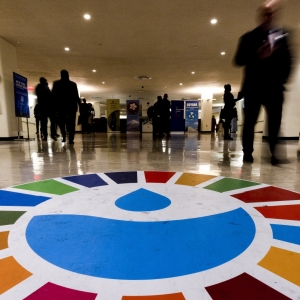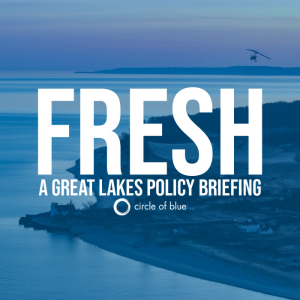Federal Water Tap, April 3: DHHS Seeks Household Water Debt Data
The Rundown
- Federal agency wants to understand household water debt.
- Congress disapproves of the Biden administration’s WOTUS rule.
- Water bills introduced in Congress relate to infrastructure funding, Snake River dams, environmental justice, evapotranspiration data, and tribal water rights settlements.
- The EPA proposes changes to Consumer Confidence Reports for drinking water.
And lastly, the White House and Ottawa promise to focus on Columbia River Treaty negotiations.
“People don’t realize how much California’s a salmon state. The Sacramento River is one of the big salmon rivers off the West Coast.” — Micheal Milstein, a National Oceanic and Atmospheric Administration spokesman, speaking to the Sacramento Bee about the cancellation of the state’s salmon fishing season. Near record-low numbers of fall Chinook returned to California rivers last year.
By the Numbers
80 Percent: Share of U.S. electrical grid energy storage capacity that comes from pumped storage hydropower, according to a GAO report. Most pumped storage facilities were built generations ago. The last new facility to come online was in 2012.
News Briefs
Congress Passes Resolution to Overturn Administration’s Clean Water Rules
The Senate joined the House in passing a resolution to overturn the Biden administration’s rules for determining which water bodies are protected by the federal Clean Water Act.
The White House objects to the resolution, saying that it will veto the measure.
Other Water-Related Bills in Congress
The Waters of the United States resolution was not the only water-related action in Congress. Other recent bills include:
- The WATER Act, which would establish a $35 billion trust fund for water infrastructure improvements. More than 70 House Democrats and a handful of their Senate counterparts support the bill, which was first introduced in 2016.
- House Democrats introduced the Environmental Justice for All Act, which among many things would require an evaluation of cumulative pollution impacts during permitting processes under the Clean Water Act. The bill was first introduced in 2018.
- Great Lakes representatives introduced a resolution that asks President Biden not to allow Canada to store nuclear waste near the lakes. Canada’s nuclear agency is investigating a storage site in Ontario, about 40 miles from Lake Huron.
- The Senate Indian Affairs Committee advanced two tribal water rights settlements, one for the Tule River Tribe and the other for four pueblos (Acoma, Laguna, Jemez, and Zia) in New Mexico.
- Pacific Northwest Republicans introduced the Northwest Energy Security Act, a bill aimed at preventing the breaching of four dams on the lower Snake River.
- Western senators introduced the OpenET Act, which directs the Interior secretary to establish a program to share evapotranspiration data. Such data would help farmers, ranchers, and cities understand water availability. The bill authorizes $23 million a year for five years.
Revising Drinking Water Info Pamphlets
The EPA is proposing to change the way that utilities communicate with their customers about drinking water quality.
Today utilities are required to send out Consumer Confidence Reports annually. The reports outline drinking water quality data for the utility.
Under the new proposal, utilities serving more than 10,000 customers would need to send the reports twice a year. They will also have to make changes to improve the clarity and accessibility of the information.
A separate provision in the proposal affects the EPA’s oversight capacity. The agency wants to collect from the state all data to monitor utility compliance with federal water quality laws – not only instances of violations but the sampling data that underlies them.
Studies and Reports
Household Water Debt
The Department of Health and Human Services agency that handles water-bill assistance wants to better understand the extent of household water debt in the country.
The Office of Community Services notified water utilities of a survey to collect data about household past-due balances, number of water shutoffs, rates, and other utility characteristics. The results of the survey will help with the implementation of the federal government’s water-bill assistance program.
In context: Millions of Americans Are in Water Debt
On the Radar
PFAS Proposal Open for Comment
The EPA published its draft rules for PFAS in drinking water in the Federal Register, beginning a public comment period that ends on May 30.
Submit comments via www.regulations.gov using docket number EPA-HQ-OW-2022-0114.
Columbia River Treaty
In a joint statement following their meeting in Ottawa, President Joe Biden and Prime Minister Justin Trudeau said that the two countries will “intensify their work over the coming months” toward a new agreement on the uses of the shared waters of the Columbia River.
Dams in the basin provide hydropower and flood protection, but the 1964 treaty that governs their use says nothing about salmon, climate change, and ecosystems. Adding these features is the point of the renegotiation.
Federal Water Tap is a weekly digest spotting trends in U.S. government water policy. To get more water news, follow Circle of Blue on Twitter and sign up for our newsletter.
Brett writes about agriculture, energy, infrastructure, and the politics and economics of water in the United States. He also writes the Federal Water Tap, Circle of Blue’s weekly digest of U.S. government water news. He is the winner of two Society of Environmental Journalists reporting awards, one of the top honors in American environmental journalism: first place for explanatory reporting for a series on septic system pollution in the United States(2016) and third place for beat reporting in a small market (2014). He received the Sierra Club’s Distinguished Service Award in 2018. Brett lives in Seattle, where he hikes the mountains and bakes pies. Contact Brett Walton







Leave a Reply
Want to join the discussion?Feel free to contribute!